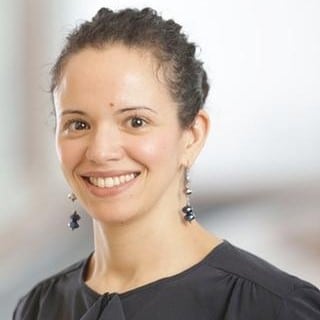Researcher Spotlight: Carla Casulo, MD
Wilmot Cancer Insitute, University of Rochester
Dr. Casulo became interested in hematology and lymphoma research as a young child. “My mother worked as a hematology and bone marrow technician at a New York City hospital for over 40 years. Growing up I would hear about interesting cases and even learned to look at peripheral smears,” she says. “Lymphoma always appealed to me because of the heterogeneity of each disease subtype, the intellectually challenging biology, and the variability in presentation and opportunity to tailor treatment to patients both young and old.” Now an Assistant Professor at the Wilmot Cancer Institute, University of Rochester, Dr. Casulo is researching the biological mechanisms and potential new treatment strategies for patients with high-risk and/or relapsed follicular lymphoma (FL). Her desire to develop both her current research and professionally as a clinical researcher led her to apply to the LRF Clinical Research Mentoring Program (LCRMP), for which she was selected as a 2015 LRF Scholar.
After previously demonstrating that FL patients whose disease returns less than two years after initial treatment have a poor prognosis, the project Dr. Casulo brought to the LCRMP Workshop in February 2015 seeks to expand on that research, determining the biological factors that may distinguish high-risk FL patients from FL patients with more favorable outcomes, and potential treatment strategies. “Until now, it was previously unknown that early relapse is a critically important predictor of poor outcome in follicular lymphoma… This discovery has inspired multiple questions regarding high-risk patients, including what distinguishes their disease biology, how can molecular predictors of risk be identified at diagnosis, and what are the optimal treatment strategies for these high-risk patients, both at diagnosis and at relapse,” Dr. Casulo says. “I am very excited about the opportunities that lie ahead for this project, which in the long term have the potential to change the paradigm to how we approach patients with follicular lymphoma.”
Dr. Casulo received her MD from the State University of New York at Downstate (in Brooklyn) and completed a residency at Yale University and a fellowship at Memorial Sloan Kettering Cancer Center, before taking her first faculty position at the University of Rochester. “I have always held the LRF in high esteem for its significant contributions to lymphoma research and its commitment to the career development of young investigators,” Dr. Casulo notes. “I firmly believe [the LCRMP] will significantly help bolster my career in strengthening my knowledge about research practices in lymphoma specifically, including statistical design and interpretation of data, which will make my project stronger as a result.” She adds that it is her patients who inspire her dedication to lymphoma research. “Their fierce commitment to staying alive and fighting against these terrible diseases is incredibly inspiring and fuels my desire to help eradicate lymphoma…. I see it as my life’s work and moral obligation to contribute to the understanding of lymphoma biology and the development of precision treatment in a way that will significantly impact how we approach these individual patients and their diseases.”

